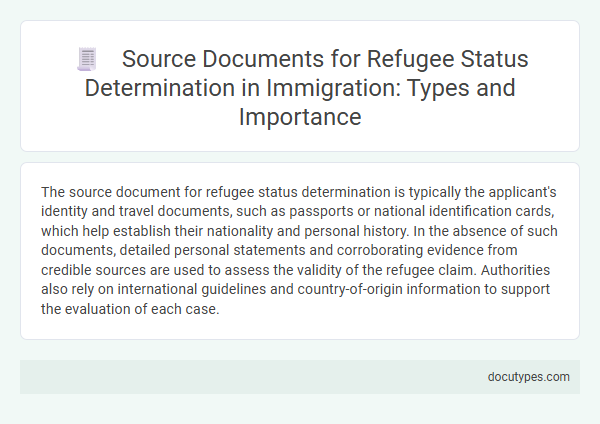The source document for refugee status determination is typically the applicant's identity and travel documents, such as passports or national identification cards, which help establish their nationality and personal history. In the absence of such documents, detailed personal statements and corroborating evidence from credible sources are used to assess the validity of the refugee claim. Authorities also rely on international guidelines and country-of-origin information to support the evaluation of each case.
Introduction to Refugee Status Determination (RSD)
Refugee Status Determination (RSD) is the legal process used to evaluate an individual's claim for protection as a refugee. This procedure identifies whether a person qualifies for refugee status based on international and national laws.
- Definition of Refugee Status - Refugee status is granted to individuals who have a well-founded fear of persecution due to race, religion, nationality, membership in a particular social group, or political opinion.
- Role of Source Documents - Source documents provide essential evidence and background information used by decision-makers to assess the validity of refugee claims.
- Primary Source Document - The key source document for RSD is the applicant's detailed personal statement outlining their experiences and reasons for seeking asylum.
Overview of Key Source Documents in RSD
| Source Document | Description | Purpose in Refugee Status Determination (RSD) |
|---|---|---|
| Refugee Claim Form | A personal account form completed by the asylum seeker detailing reasons for seeking refugee status. | Serves as the initial statement of facts supporting the claim and guides further investigation. |
| Personal Identification Documents | Passports, national ID cards, birth certificates, and other official documents proving identity and nationality. | Confirms the claimant's identity and country of origin, critical for establishing eligibility for protection. |
| Country of Origin Information (COI) | Reports and data from government, NGOs, and international organizations detailing conditions in the claimant's home country. | Helps assess the validity of claims by providing context on persecution, human rights abuses, or armed conflict. |
| Witness Statements and Expert Reports | Testimonies from witnesses or analyses by subject-matter experts regarding the claimant's situation or country conditions. | Supports or refutes claims by offering evidence beyond the claimant's own account. |
| Legal Framework and Precedents | International law such as the 1951 Refugee Convention and related case law governing refugee definitions and rights. | Provides the legal basis for deciding whether an individual qualifies for refugee status under international standards. |
Identity Documents: Passports and National IDs
The source document for refugee status determination often includes identity documents such as passports and national IDs. These documents provide essential proof of identity and nationality during the application process.
Your passport or national ID serves as a primary means to establish your background and legal status. Authorities rely on these documents to verify personal details and assess refugee claims accurately.
UNHCR Documentation and its Role in RSD
What is the source document for Refugee Status Determination (RSD)? The primary source document for RSD is the UNHCR documentation, which plays a crucial role in assessing and verifying asylum claims. UNHCR provides guidelines and official records that help determine eligibility for refugee protection worldwide.
Legal and Government-Issued Documents
The source document for refugee status determination is a critical legal and government-issued document that validates your claim for protection. It provides official evidence necessary to assess and establish eligibility as a refugee under international and national laws.
- Refugee Status Determination (RSD) Form - An official application submitted during the asylum process detailing personal information and reasons for seeking refugee status.
- Government-Issued Identity Documents - Passports, national ID cards, or birth certificates used to confirm identity and nationality.
- Legal Notices or Certificates - Documents issued by immigration authorities confirming the acceptance or processing of a refugee claim.
These documents collectively form the legal foundation for deciding on your refugee status within the host country's immigration system.
Supporting Evidence: Medical and Educational Records
Medical and educational records serve as crucial supporting evidence in the refugee status determination process. These documents help verify the applicant's identity, background, and claims of persecution or hardship.
- Medical Records - Provide evidence of physical or psychological harm that supports claims of persecution or torture.
- Educational Records - Establish the applicant's identity and continuity of residence by documenting attendance and achievements in schools.
- Authenticity - Records must be official and verifiable to strengthen the credibility of the refugee status application.
Witness Statements and Affidavits
Witness statements and affidavits serve as critical source documents in refugee status determination. These documents provide firsthand accounts and personal testimonies that support an applicant's claim of persecution or danger in their home country. Immigration authorities rely on the credibility and consistency of these statements to assess the validity of refugee applications.
Country of Origin Information (COI) Reports
Country of Origin Information (COI) reports serve as a critical source document for Refugee Status Determination (RSD). These reports provide detailed, up-to-date background data on the political, social, and human rights conditions of an applicant's country of origin.
COI reports are compiled by governments, international organizations, and research institutions to ensure objective and reliable information. RSD authorities use these documents to assess the credibility of asylum claims and to determine eligibility for refugee status.
The Importance of Document Authenticity in RSD
The source document for Refugee Status Determination (RSD) is essential in verifying an individual's claim for protection. It typically includes identification papers, travel documents, and any relevant legal certificates issued by authorities or recognized organizations.
Document authenticity is crucial in RSD to ensure accurate assessment and prevent fraud. Authentic documents provide reliable evidence of your identity and circumstances, which helps decision-makers grant protection correctly. Verifying documents reduces the risk of wrongful rejection or acceptance, securing fairness in the asylum process.
What Is the Source Document for Refugee Status Determination? Infographic

